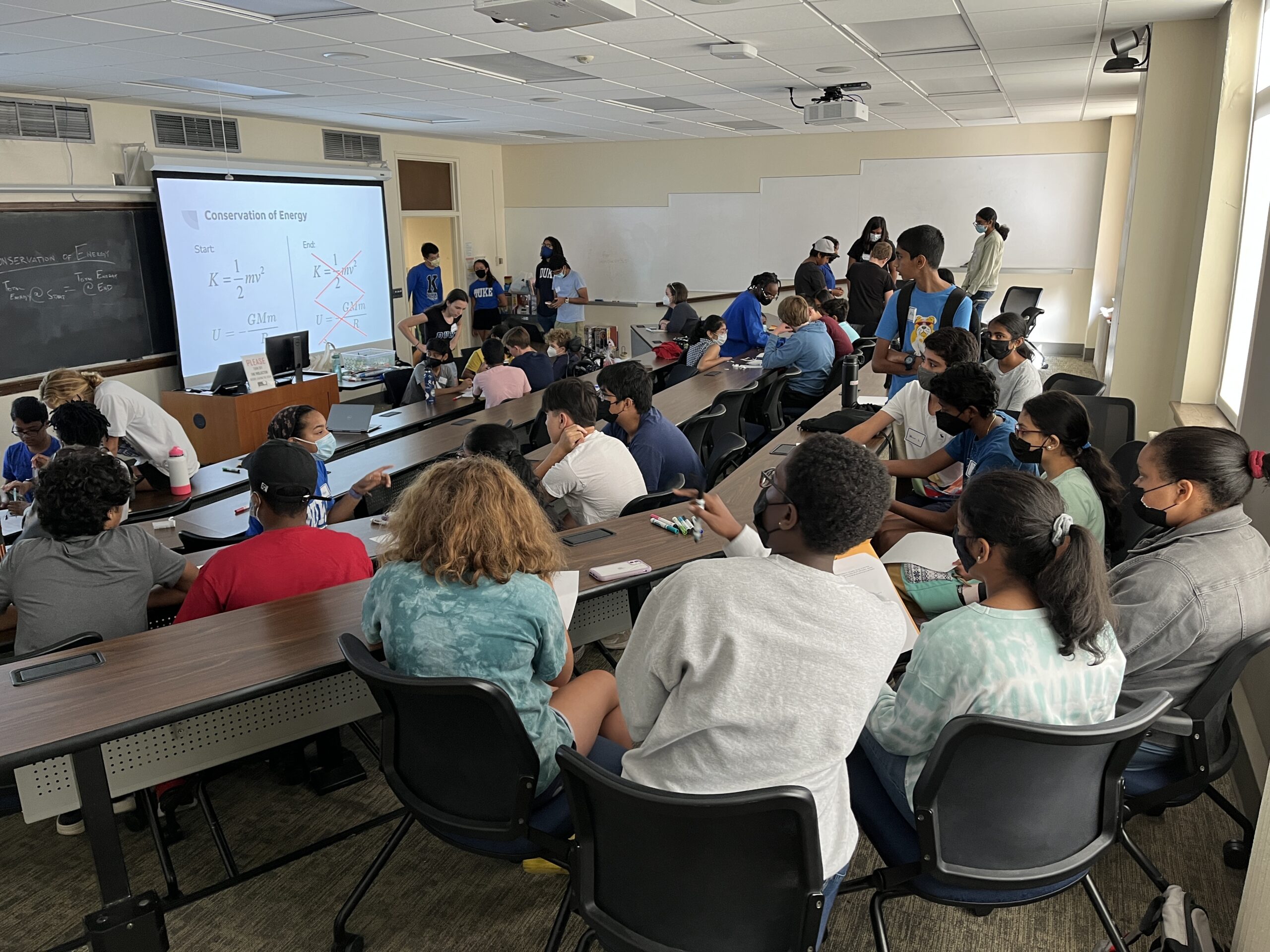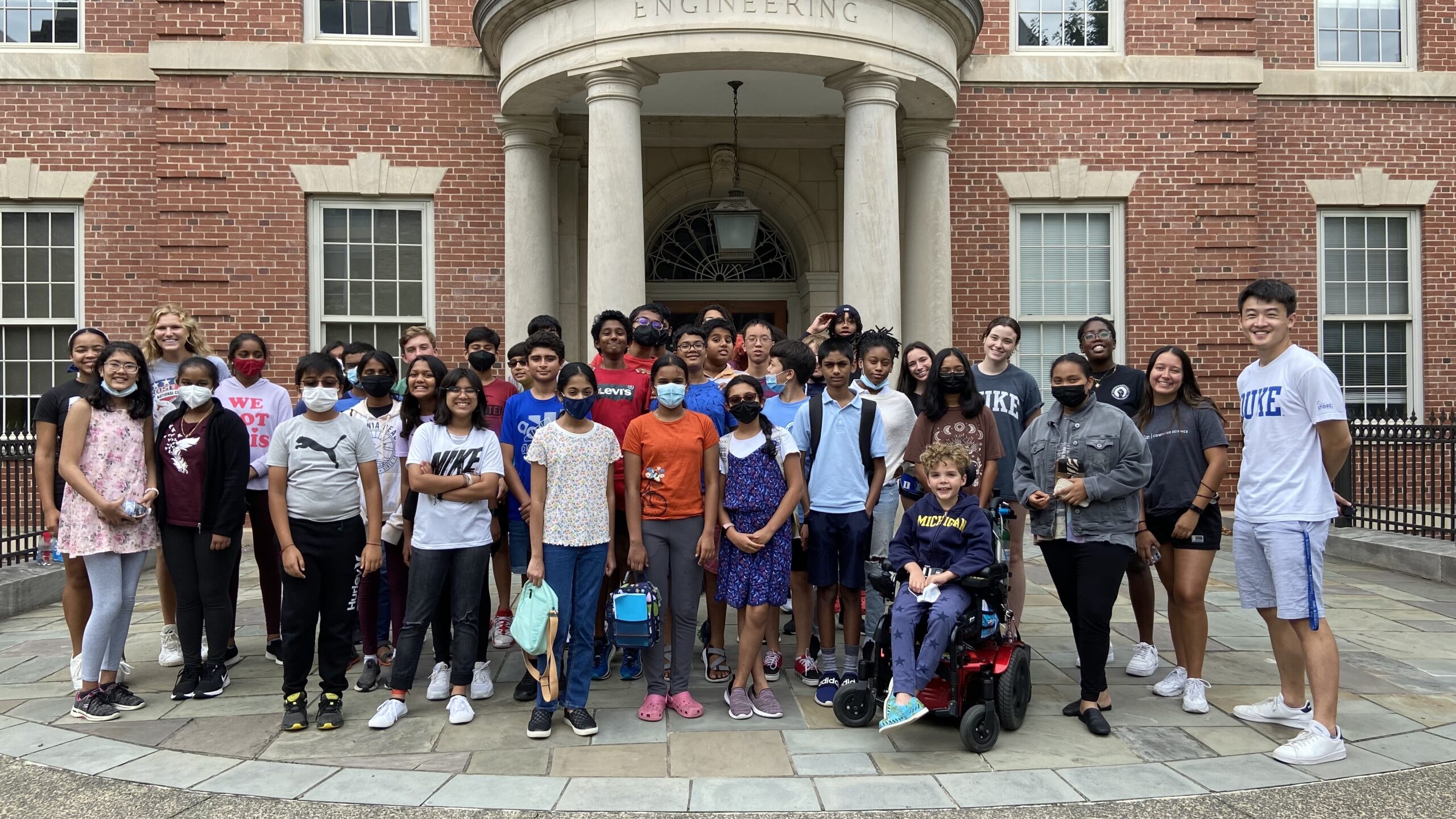Expanding the STEM Pipeline’s Flow Rate in Durham
Michaela Kane
Students from Durham, NC, learn engineering fundamentals through two summer outreach programs at Duke

Duke Summer STEM Academy
Summer break for some might involve copious amounts of video gaming, lazing around a pool and sleeping until the late afternoon. But, for these local middle school and high school students in Duke’s Summer STEM Academy, summer break involved learning how to think—and prototype—like engineers.
“North Carolina’s Research Triangle has long been a national leader in technological innovation. Student programs like these help deliver knowledge and educate the next generation of engineers.”
George Delagrammatikas | assistant chair, Thomas Lord Department of Mechanical Engineering & Materials Science
Open to rising juniors and seniors at high schools around Durham, NC, and the surrounding Research Triangle Region, the Summer STEM Academy is an intensive three-week program developed by Duke’s Thomas Lord Department of Mechanical Engineering & Materials Science (Duke MEMS).
During the hands-on experience, students learn how to use engineering tools like 3D printers, laser cutters, microcontrollers, shop tools and a variety of computer programs to craft functioning prototypes that will address global issues.
 They also receive mentorship from Duke students and faculty as they design, fabricate, test and present their inventions to judges.
They also receive mentorship from Duke students and faculty as they design, fabricate, test and present their inventions to judges.
“This program immerses students in an engineering project that challenges them to first identify problems of social relevance and then systematically apply design thinking to prototype different solutions,” says George Delagrammatikas, the assistant chair and professor of the practice in Duke MEMS. “At the end of the program, they’ll pitch their idea to a group of judges and justify their design decisions, like entrepreneurs do in the TV show, Shark Tank. It’s an intensive three weeks where students actively apply engineering principles while also leaning technical communication, teamwork and critical thinking.”
Along with presentation skills, a key feature of this program is that all students develop a digital portfolio of rhteir work which they could then use for college or job applications in the future.
Projects for summer 2022 included:
- Fila-Buster — A PLA filament shredder and composting bin that helps speed up the degradation process of the left-over biodegradable plastic generated by 3D printing
- ClimateSafe — An air quality monitoring system that can detect air hazards like carbon monoxide, combustible gas and smoke
- Windbox — A vibration sensor that can generate energy when mechanical strain is applied
- Night Night — An air conditioner and sleep-tracking app that allows users to set the optimal temperature in their bed to ensure a good night’s sleep
But it wasn’t just high school students who got a taste of life as a Duke Engineer. Middle school students also spent a week on campus developing engineering skills thanks to the Duke Innoworks STEM Camp.
Duke Innoworks STEM Camp
Launched at Duke in 2003 to educate local middle-school students, Innoworks has since grown to include numerous chapters across the United States.
But at Duke, the program still maintains its local roots, where Duke undergraduates teach Durham Public Schools students about a variety of STEM concepts
“Our goal is to find a fun and engaging way to introduce students to what life is like as an engineer.”
Kishen Mitra | Duke junior, biomedical engineering, and Innoworks Leader
Over five days, Duke students work with small teams of campers, who attend two interactive lessons and conduct two experiments per day. Camp leaders select a theme for the camp the year before, and they then develop corresponding lessons, activities and coordinated lectures that relate engineering topics to that theme.
In previous years, these topics have ranged from earthquakes to deep-sea exploration. For summer 2022, the camp theme was “Mission to Mars,” which proved to be a big hit with the participating middle schoolers.
“On the first day we did a lesson that taught students about physics and rocket design to give them a glimpse at what it takes to actually get into space,” says Mitra. “Then the following days, we had lessons and experiments on topics like solar power, rover racing and sustainability. And on the final days, we covered what it takes to return to Earth like it was the end of a journey.”
 “My favorite part was a project that involved learning how we could sustainably grow food in space using hydroponics,” says Harrison Gattis, one of the Innoworks participants. “It was a fun lesson, and it was really cool to do the work on Duke’s campus with college students.”
“My favorite part was a project that involved learning how we could sustainably grow food in space using hydroponics,” says Harrison Gattis, one of the Innoworks participants. “It was a fun lesson, and it was really cool to do the work on Duke’s campus with college students.”
“On one of the days we had an obstacle course using rovers that we programmed, and it was really challenging but fun to figure out how to quickly solve problems with our team,” says Aneesha Chugh, a rising eighth-grader. “I also loved going to the lectures and hearing from Duke professors about their work.”
The 2022 Innoworks camp marked the first in-person camp since 2019. And, while Innoworks leaders had developed a virtual option, they were glad to see so many students excited to return to the program.
“We had more than 40 students participate this year, and they came each day energized and ready for the day’s work,” said Saajan Patel, Innoworks camp counselor. “Being involved with Innoworks has been one of the most rewarding experiences I’ve had so far at Duke. It’s fun seeing something spark a student’s interest in engineering for the first time.”

